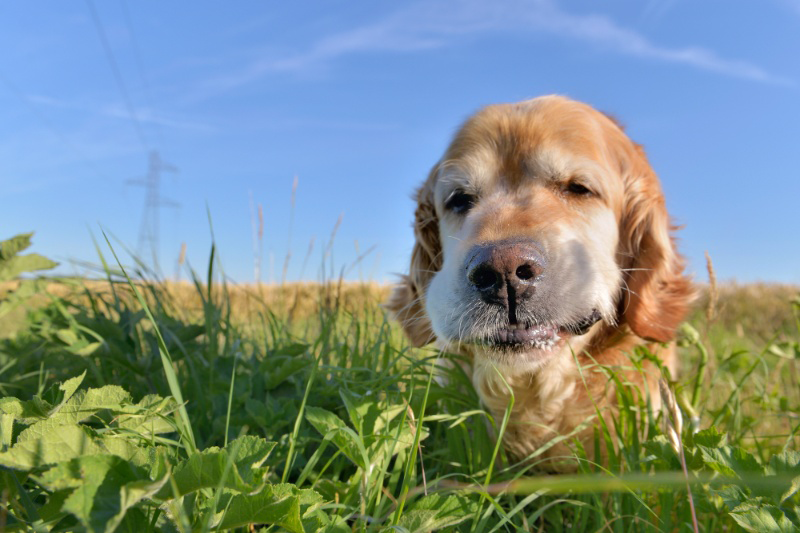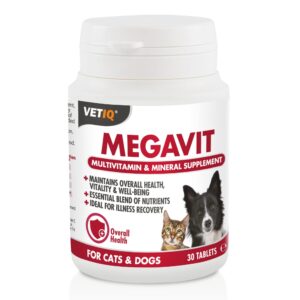Is your dog eating grass? Let’s be honest – if you’re a dog owner, there is a very good chance you’ve observed your beloved four-legged companion indulging in this peculiar habit! This widespread practice often leaves pet owners perplexed, prompting them to question the motives behind it and whether it necessitates concern.
To gain a deeper understanding of this phenomenon, let’s delve into the underlying causes and examine a variety of strategies that can be employed to discourage this intriguing behaviour.
Why is my dog eating grass?
Instinctual reasons
Despite being domesticated, dogs have managed to retain certain instincts inherited from their ancestral predecessors, and one such behaviour is their tendency to eat grass.
In prehistoric eras, wild canines were classified as omnivores, as they would consume the entirety of their prey, including the plant matter present in the prey’s stomach. Consequently, the act of your dog eating grass may serve as a faint echo of their ancient lineage.
There are instances when dogs feel the need to ingest additional roughage to maintain the proper functioning of their stomachs, which can manifest as grass consumption.
However, it is important to remain vigilant if your dog regularly engages in grass eating, especially during routine walks, as this could warrant further investigation and raise concerns regarding their well-being.
Nutritional considerations
While dogs are predominantly carnivorous animals, there are instances where they might display a tendency to seek out grass as a part of their diet if certain nutrients are lacking.
To mitigate this behaviour, it is essential to provide your dog with a well-balanced and high-quality diet that encompasses all the vital nutrients they require. A carefully formulated diet will help minimise their inclination to consume non-food items, such as grass. It is crucial to ensure that you are feeding your dog an appropriate amount of food suitable for their specific age, size, weight, and nutritional needs.
By addressing their dietary requirements adequately, you can help discourage their urge to seek out grass for supplementary nutrition.
Boredom and behavioural factors
On certain occasions, dogs may engage in grass consumption as a result of boredom or a lack of mental stimulation. To address this, it is important to provide your dog with regular exercise sessions that adequately challenge their physical abilities. Engaging in activities such as walks, runs, or playtime in a secure and stimulating environment can help alleviate their boredom and divert their attention from grass-eating tendencies.
In addition to physical exercise, incorporating interactive toys into their routine can provide mental stimulation and engagement. Toys that encourage problem-solving or offer treats as rewards can keep your dog’s mind occupied and diminish their inclination to seek out grass for entertainment.
Furthermore, incorporating various forms of mental enrichment activities, such as puzzle toys, scent games, or obedience training, can help stimulate your dog’s cognitive abilities and provide them with the mental challenges they need. This can go a long way in preventing the development of grass-eating habits stemming from boredom.
Medical reasons for dog eating grass
In certain instances, the act of a dog eating grass may serve as a potential indicator of underlying medical conditions, including gastrointestinal upset or the presence of intestinal parasites. It is crucial to consider factors such as the timing of your dog’s last deworming treatment and whether they may have ingested anything that could potentially irritate their stomach.
However, it is vital to be attentive to additional concerning symptoms that may accompany grass-eating behaviour. If your dog displays signs such as an abnormal increase in hunger or thirst, unusual lethargy, wheezing, or trembling, it is strongly advised to promptly seek veterinary attention. These symptoms could signify a more serious underlying health issue that requires professional assessment and treatment.
By carefully monitoring your dog’s behaviour and promptly addressing any alarming symptoms, you can ensure their overall well-being and receive appropriate guidance from a veterinarian if necessary.
Grass as a natural laxative
It is not uncommon for dogs to instinctively consume grass as a means to induce vomiting or alleviate digestive discomfort.
If you observe your dog engaging in grass-eating behaviour and subsequently vomiting, it is crucial to promptly seek veterinary advice. This is particularly important to determine whether there is an underlying serious issue such as a stomach problem, gastrointestinal blockage, or infection that requires professional attention and treatment.
While in many instances, the dog may eat grass and resolve the issue on their own, it is essential to remain vigilant and closely monitor their condition. Look out for any additional or new symptoms that may emerge, as these could indicate a need for further evaluation by a veterinarian.
By being proactive and seeking veterinary guidance, as well as maintaining close observation, you can ensure the well-being of your dog and address any potential underlying concerns that may arise from its grass-eating behaviour.
Some thoughts on discouraging dogs from eating grass
If you have ruled out any potential medical issues as the cause of your dog’s grass-eating behaviour and are still seeking ways to discourage it, employing proactive techniques can be helpful.
One effective method is to utilise redirection and positive reinforcement. When you observe your dog displaying interest in grass, divert their attention to a toy or offer a treat as an alternative. Over time, this technique can train your dog to shift its focus away from grass and toward more desirable activities.
It’s worth noting that some dogs may go through phases where they are inclined to eat grass, which could stem from instinctual behaviours. It is generally considered that small quantities of grass are unlikely to pose significant harm to dogs. However, maintaining vigilance and monitoring their behaviour is always prudent.
As you spend more time with your dog, you may start to recognise certain cues associated with their grass-eating habits. For instance, it could occur after consuming a particular treat or type of food, potentially indicating an allergy or intolerance. Being aware of these patterns can help identify any underlying issues and guide you in taking appropriate actions.
Understanding the underlying reason behind your dog’s grass-eating behaviour is the first step in addressing the issue effectively. Whether it is a nutritional deficiency, a need for mental stimulation, or a potential symptom of an underlying health problem, identifying the cause can assist you in implementing the most suitable course of action.
However, it is crucial to remember that consulting with your veterinarian is always essential when you have concerns about your pet’s behaviour or health. While occasional grass-eating may not be harmful or indicative of a medical problem, erring on the side of caution and seeking professional advice is advisable. Your veterinarian can provide guidance tailored to your specific situation and ensure the well-being of your furry companion.
Our Healthy Treats Calming can help distract and calm your dog
If you’re looking for an effective solution to curb your dog’s grass-eating habit, consider Healthy Treats Calming from VETIQ.
Healthy Treats Calming not only offer a delectable taste but also serve as a healthy distraction for your dog. These specially formulated treats are designed to promote relaxation and reduce anxiety in dogs, making them a valuable tool for combatting the restlessness or anxiety that can potentially trigger grass-eating behaviours.
By incorporating Healthy Treats Calming into your dog’s routine, you can provide them with a positive alternative to grass consumption while simultaneously helping to alleviate their anxiety and promote a sense of calm.
Here at VETIQ, we love animals and we care about pet owners too, so don’t forget to browse our blog for tons more pet-related tips and advice!













